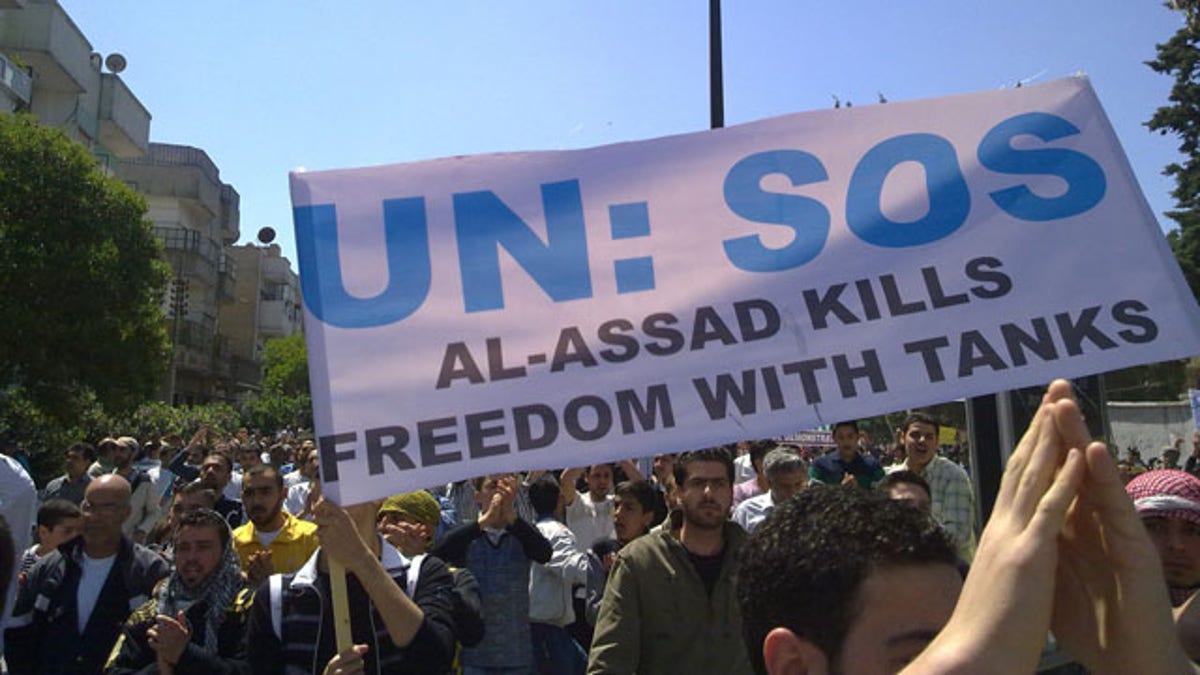
May 6: In this citizen journalism image made on a mobile phone and acquired by the AP, Syrian anti-government protesters carry a banner during a rally in the central city of Homs, Syria. (AP2011)
A human rights watch group reports that over 800 people have died in the Syria uprising as Syrian tanks rolled into a Mediterranean coastal town on Saturday in an escalating crackdown by President Bashar Assad.
Human rights watch group Sawasiah tells Sky News that the deaths have occurred over the past seven weeks. This also included Friday's clashes that left at least 30 dead nationwide, activists and an eyewitness said.
Details of the troop deployment in Banias, for weeks the scene of demonstrations demanding regime change, were scarce as phone lines and other communication with the area were mostly cut off.
An eyewitness reached by The Associated Press said soldiers deployed in Banias early Saturday.
He said tanks moved into the seaside area and were stationed in at least three Sunni villages just south of Banias, adding that soldiers were carrying out house-to-house searches and arrests in al-Marqab district about a mile southeast of the town and in the villages of Bayda and Basatin further south.
He said the army is now occupying the hilltop Marqab Castle, an 11th century crusader fortress overlooking Banias.
"Banias is now surrounded from all directions, not a single person can go in or out," said the resident, who did not wish to be identified for fear of reprisals.
He said electricity and phone lines had been cut off, and residents were charging their mobile phones on car batteries.
Banias, which has an oil refinery and is the main point of export for Syrian oil, has a potentially explosive mix of religious groups and sects. It is divided between Sunni Muslims and Alawites -- the sect of the ruling Assad family and many senior officials.
The eyewitness reported seeing several gunboats off the Banias coast. He said an atmosphere of fear and apprehension has taken over the town, adding that two-thirds of the population has already fled, notably women and children.
Activists in touch with townspeople confirmed his account, saying the town, which had become a leading focus of anti-regime demonstrations, was now completely besieged. The activists also spoke on condition of anonymity, citing security concerns.
Also on Saturday, thousands of people took part in the funerals of three people who were killed Friday in the central city of Homs.
Another funeral was taking place in the Damascus suburb of Saqba for a man shot dead by security forces manning a checkpoint as he was riding a motorcycle. Activists said participants in both funerals were chanting against the regime.
The Banias deployment came just hours after Friday's confrtations beteen security forces and protesters. A leading Syrian human rights activist said security forces killed 30 people across the country; Syria's state-run media said 10 soldiers and policemen were killed in Homs.
The latest tank deployment raises fears of a large-scale military operation in Banias, similar to the one carried out in the flashpoint southern city of Daraa.
Daraa, near the Jordanian border, has been under siege since April 25, when Syrian authorities cut off electricity and phone lines and deployed tanks and snipers to crush dissent there.
The army announced the end to an 11-day military operation on Thursday, but residents have said troops still remain in the streets. About 50 people have been reported killed in Daraa over the past 10 days.
The uprising in Syria was sparked by the arrest of teenagers who scrawled anti-regime graffiti on a wall in Daraa. Protests spread quickly across the nation of some 23 million people.
The U.N. said Saturday it is sending a team into Syria to investigate the situation, and the European Union is expected to place sanctions on Syrian officials next week. Both actions are significant blows to Assad, a British-educated, self-styled reformer who has tried to bring Syria back into the global mainstream over his 11 years in power.
In Washington, State Department spokesman Mark Toner said the U.S. was pressing the Syrian government to cease "violence against innocent citizens who are simply demonstrating and trying to state their aspirations for a more democratic future."
The bloodshed Friday was the latest spasm in what has become a weekly cycle of mass protests followed by a swift and deadly crackdown. Assad insists the unrest is a foreign conspiracy carried out by "terrorist groups."
The Associated Press contributed to this report.







































